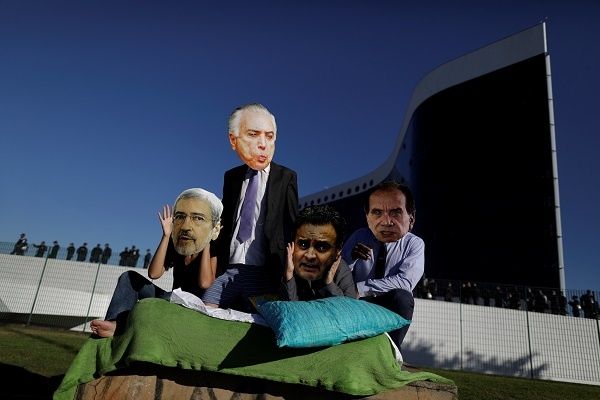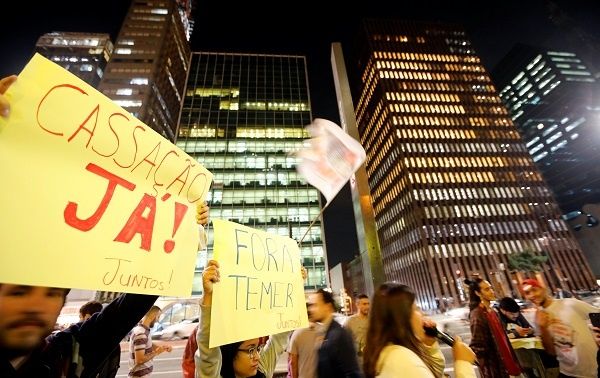Brazil's Temer Could Lose Power as Fraud Accusations Pile Up
especiales

Temer is increasingly under pressure to resign, while court processes threaten to further jeopardize his executive power.
As multiple corruption scandals continue to swirl around Brazilian President Michel Temer and his government, the country's top electoral court has relaunched a case that could remove the president from office over alleged illegal financing in his 2014 campaign as running mate to former President Dilma Rousseff.
RELATED: Brazil's Temer Defies Calls to Step Down over Wiretap Scandal
The court entered its second day of debates Wednesday, and analysts predicted the process could take weeks as several judges have requested more time to study the case to continue the hearings.
Just hours ahead of the scheduled start of the hearing Tuesday, Brazil's federal police sent Temer Monday an interrogation document with a list 84 questions as part of a separate investigation probing the president over accusations of corruption, organized crime and obstruction of justice.
Initially, Temer had 24 hours to respond to the questions, a deadline that ended Tuesday afternoon at 4:30 p.m. local time.
But his lawyers requested an extension as they argued it was "absolutely impossible to demand a manifestation of the President of the Republic in the short term of 24 hours." The new deadline is set for Friday afternoon 5:00 p.m. local time.
 Protesters with face masks of Brazil's politicians. Photo: Reuters
Protesters with face masks of Brazil's politicians. Photo: Reuters
 Protest against Temer in Sao Paulo. Photo: Reuters
Protest against Temer in Sao Paulo. Photo: Reuters
 Police patrol in front of the federal court in Brasilia. Photo: Reuters
Police patrol in front of the federal court in Brasilia. Photo: Reuters
As the election financing case moves forward and other corruption allegations continue to crash down around the president, protesters gathered outside the federal court in Brasilia to demand Temer's resignation and call for direct elections to choose the next president of Brazil.
The accusations stem from an explosive wiretap, reported May 17, in which Temer was heard appearing to give his approval to bribes to buy the silence of the jailed former president of the lower house of Congress, Eduardo Cunha, the chief mastermind behind the impeachment of Dilma Rousseff last year and a powerful witness in government corruption cases.
RELATED: Protesting Austerity, Brazil's Workers to Shut Down Cities in General Strike June 30th
The conversation was recorded by Joesley Batista, chairman of JBS, the largest meatpacking company in the world, which was also involved in a large corruption scandal for bribing Brazilian politicians, as part of a bid to win a plea bargain deal with prosecutors.
The bribes were intended to keep Cunha silent about embarrassing secrets that could jeopardize the legitimacy of Temer's presidency. In the leaked wiretap, Temer is heard telling Batista about the payments: “Look, you've got to keep that up.”
The president said the recording wasn't proof of wrongdoing. He said that he didn't report the bribery references to authorities because he did not believe them. The case was delayed as authorities investigated the source of the audio.
Attorney General Rodrigo Janot has accused Temer of corruption, criminal organization and obstruction of justice as a result of the wiretap. Temer separately faces accusations of irregular campaign financing and has also been named in the central corruption investigations, known as Operation Car Wash, probing a bribery scheme in the state-run oil campany, Petrobras.
According to Brazilian Constitution, if Temer resigns or is dismissed, Congress must approve an indirect election to choose the person who will continue the electoral period that Rousseff began in 2015 and that ends on Jan. 1, 2019. Tuesday's electoral financing trial could unseat the president, or he could face an impeachment process over corruption accusations. Both processes would likely be lengthy.
Brazilians have taken to the streets to demand Temer's resignation and for immediate direct elections to be held to allow Brazilian voters to elect the next president. Temer has reiterated that he will not be resigning.
According to a new poll released Monday by the country's largest labor union, known as the CUT, nine out of 10 Brazilians prefer direct general elections and 75 percent reject Temer's administration.













Add new comment